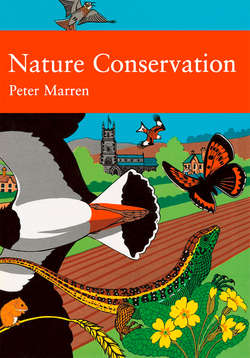Читать книгу Nature Conservation - Peter Marren - Страница 6
Editors’ Preface
ОглавлениеIt is 32 years since Dudley Stamp’s New Naturalist on Nature Conservation in Britain appeared. Published posthumously, it summarised events and progress up to 1965, concentrating on the dominant role of the official Nature Conservancy. Since then, nature conservation has become much more fraught and politicised. It is in continual conflict with the forces of modern ‘progress’, in the increasing demands made on the natural environment by agriculture, forestry, mineral extraction, water use, energy supply, transport, urban development, recreation and defence. The voluntary bodies for nature conservation have also grown to rival the official side in importance. These massive shifts require a completely new book that takes over the story where Dudley Stamp left off.
Peter Marren is the acclaimed author of the 50th anniversary volume, The New Naturalists (1995), whose earlier career was in the Nature Conservancy Council. As a regional staff member in Scotland and later England, he saw things from the front line of nature conservation. His later role, in compiling its Annual Report, gave him an overview of the whole wide field of activities and issues in which the NCC became involved, and an insight into the frequently political nature of skirmishes with opposing vested interests. Then the NCC was devolved, and Peter found himself in English Nature, with a much reduced geographical remit and a new management-cum-public relations style. Unable to stand the combination of internal regimentation and external timidity, he resigned, to start a new career as a freelance writer on wildlife and its conservation. To this he brought a distinctive style, of fluent prose allied to sardonic wit, winning many fans who relish the appearance of his next work.
Peter’s perceptive eye has ranged over an astonishingly broad field in this new book, and he has told its complicated story with his usual flair. This is an honest appraisal of the net results of all the years of striving on behalf of wild nature in Britain – an assessment of the balance between success and failure. He puts all aspects of the business under the microscope: the organisations concerned, the threats to nature, the measures for dealing with these, the politics involved, and the outcomes on the ground. The book is analytical as well as factual, but enlivened by its author’s characteristic flashes of humour. This re-evaluation shows that, despite many successes in saving important wild places, plants and animals, losses have also continued on an unacceptable scale. Nature reserves do, at least, give us some tangible reward for all the effort, but the results from the persuasion approach are often more difficult to measure. In giving us this invaluable reference work, Peter Marren has also conveyed the richness and splendour of our national capital of wild nature, and its importance to our cultural heritage. Its defenders also have sombre lessons to learn from this synthesis if they are to improve their performance during this new millennium.
